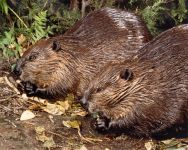


|

|
|
 
|
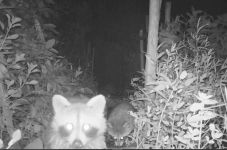
29th: It is Five Dollar Friday, an easy and affordable way to support Unexpected Wildlife Refuge as we reach the end of our 56th year. Some of our efforts this year included trying to ban trapping state-wide; helping people live peacefully with beaver families; educating people on living humanely with wildlife in general; working with others in protecting wildlife from killing contests; providing the opportunity for all indigenous wildlife to live freely in our nearly 800 acres of Pine Barrens habitats... and much more.
We need your support! Five minutes and five dollars today will help us continue our work. Click the Donate button at the top of our Facebook page to pledge your commitment to helping those who continue to be victims of human prejudice and greed. Please donate and share! – VVH
#fivedollarfridays
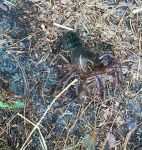
28th: Throwback to this delightful and unusual sighting of a crayfish crossing the yard not far from the main pond. – VVH
#tbt #ThrowbackThursday #UWRHistory #crayfish
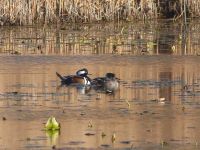
27th: A hooded merganser couple temporarily spend a sunny day on the main pond. – VVH
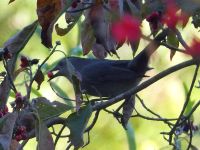
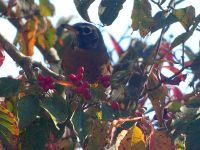
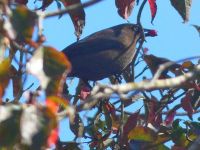
25th: One of the plants that provides food for a variety of animals is the dogwood tree. In early winter, it becomes a popular gathering place for many species of birds who benefit from the seasonal berries. Here, a gray catbird, American robin and rusty blackbird pick the berries, each arriving at different times throughout the day. – VVH
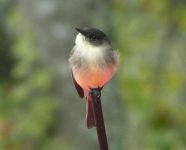
23rd: An eastern phoebe perches on the antenna of my car in front of the cabin at the Refuge. Note the pink reflection on the normally creamy-yellow belly from the bright red car below. – VVH
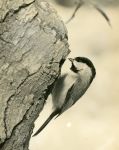
21st: Throwback to 1967, when Al Francesconi, Refuge visitor and photographer, captured this beautiful image of a Carolina chickadee. – VVH
#tbt #ThrowbackThursday #UWRHistory
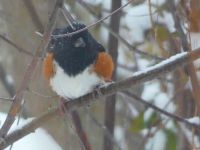
20th: An eastern towhee sits in a bare shrub during the first snow at the Refuge. – VVH
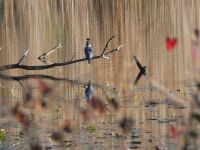
18th: Here, a male belted kingfisher is perched on a branch in the main pond, with a fish he had just caught. It is not our place to moralize about the plight of the fish given that non-human animals appear not to have the kind of choices people have when it comes to sustaining themselves. – VVH
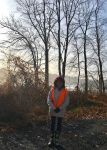
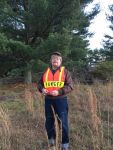
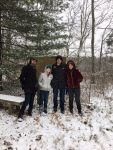
16th: We started the six-day firearm deer 'season' protection patrol with the first frost and had our first snow on the last day. Thank you to all our dedicated volunteer patrollers who helped keep the Refuge and its inhabitants safe! Because hunting 'season' will continue at least through the last day in January 2018, we still have need for additional volunteers. Please call (856.697.3541) or E-mail (director@unexpectedwildliferefuge.org) if you would like to be added to the schedule. We sure could use your help! – VVH
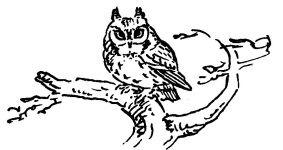
14th: Throwback to this undated sketch of an owl by Hope Sawyer Buyukmihci, Refuge co-founder. Speaking of owls, we have been hearing great horned owls, a male and a female, calling back and forth to each other during the evenings. – VVH
#tbt #ThrowbackThursday #UWRHistory
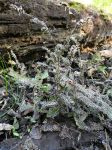
13th: A beautiful slime mold covers some plants near one of the walkways through a wetland area at the Refuge. It reminded me of the frosty coating on sugar plums. – VVH
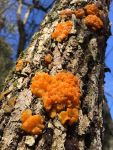
11th: This orange-yellow amber jelly roll fungus, also known as "witch's butter", had grown rapidly on this tree after recent rain. – VVH
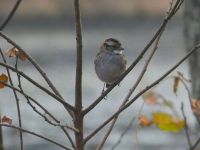
9th: A small white-throated sparrow perches in a shrub next to the main pond. – VVH
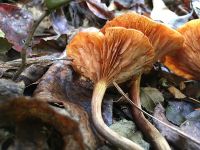
6th: Some delicate honey fungus (mushrooms) along the boundary trail at the Refuge. – VVH
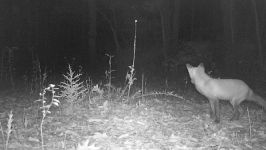
4th: A red fox appears in front of one of the trail cameras at the Refuge. – VVH
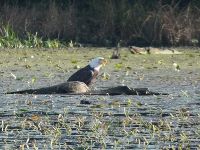
2nd: A bald eagle calls for her or his mate from the middle of the main pond at the Refuge. – VVH
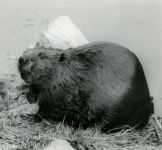
30th: Throwback to this beautiful image of a beaver who just emerged from the water at the Refuge. It was captured in 1987 by Hope Sawyer Buyukmihci, Refuge co-founder. We love to share these images of beavers living peacefully for many generations at the Refuge. Beavers take only what they need, keeping the wetland habitats healthy and vital for other wildlife. – VVH
#tbt #ThrowbackThursday #UWRHistory #beavers #wetlands
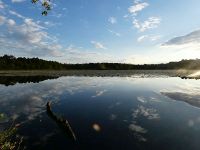
29th: The main pond shortly before sunset. – VVH
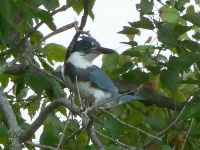
27th: A belted kingfisher sits perched in a tree close to sunset, watching the surface of the main pond. – VVH
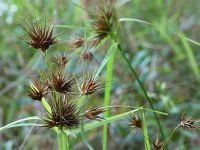
25th: Pictured is a stand of tall beaksedge near the main pond. An indicator of healthy wetlands, tall beaksedge grows only in these habitats and is scarce or rare in many states. – VVH
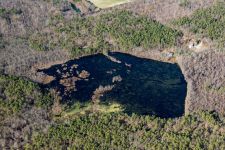
23rd: Throwback to this amazing aerial shot of the main pond environs taken by Cliff Compton, friend of the Refuge and photographer. Although the photo shows only a small part of the 767 acres comprising the Refuge, it is a beautiful reminder of why this sanctuary is so vital. – VVH
#tbt #ThrowbackThursday #UWRhistory #NJPinelands
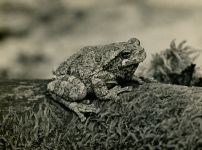
22nd: We have been accepted to be part of the Newman's Own Foundation $500,000 Holiday Challenge, administered through CrowdRise. Every donation ('voting') through our page at CrowdRise increases the chance of our receiving additional funding through one of the Challenge prizes which range from $2,500 for 10th place up to $150,000 for first place.
'Voting' through your donations is now available on our CrowdRise page. The program ends 3 January 2018, so please act now to increase our chances of a prize. And, share this with others so that the wildlife at our Refuge can benefit from this opportunity for financial support. – VVH
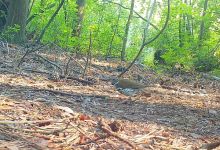
20th: This wood thrush hopped in front of a Refuge trail camera early one morning earlier this year. – VVH
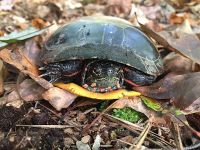
18th: A small eastern painted turtle sits nestled amongst some fallen leaves next to one of the Refuge trails during a recent light rain. – VVH
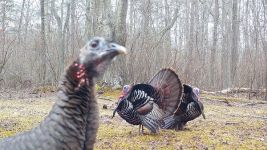
16th: Throwback to one of my favorite trail camera images, the turkey 'selfie'. I love when the cameras capture images of these animated, social, sometimes boisterous birds. – VVH
#tbt #ThrowbackThursday #UWRHistory #wildturkeys
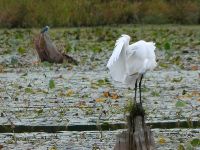
14th: Occupying neighboring stumps, a great egret and a belted kingfisher share a bit of space on the main pond at the Refuge. – VVH
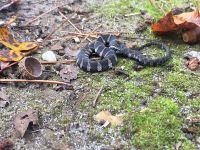
12th: I recently had the pleasure of meeting this tiny northern water snake baby alongside a Refuge trail. The acorn parts to either side emphasize the adjective "tiny". – VVH
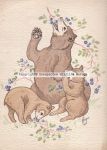
9th: Throwback to one of the gorgeous watercolors painted by Hope Sawyer Buyukmihci, Refuge co-founder, artist and author. With the holidays around the corner, you can support Unexpected and surprise someone with a print of one of Hope's paintings available at our Zazzle storefront. The prints there will be sans copyright watermark, of course. Proceeds go to supporting our wonderful Refuge and all who dwell within. – VVH
#tbt #ThrowbackThursday #UWRhistory #zazzle #wildlifeart
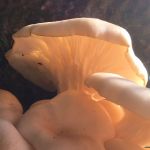
8th: Recently, I found this small patch of young oyster mushrooms growing on an old log at the Refuge. – VVH
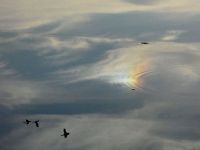
6th: A small group of airborne American black ducks and an overhead rainbow are reflected in the water of the main pond. – VVH
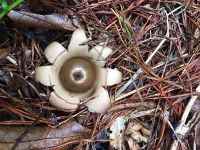
4th: One of my (many) personal favorites of all the local funguses is the group known as earth star mushrooms. Shown here is a rounded earthstar mushroom along one of the Refuge trails. – VVH
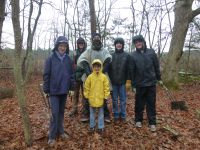
2nd: Throwback to an awesome volunteer day in fall of 2015, with one of our dedicated local Boy Scout troops. Do you know a Scout who is looking to complete a community project? E-mail to director@unexpectedwildliferefuge.org or call (856.697.3541) us and we can determine if one of our many on-going projects might be suitable. – VVH
#tbt #ThrowbackThursday #UWRhistory #scouts
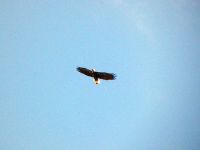
1st: A bald eagle soars above the Refuge recently in a clear blue sky. – VVH
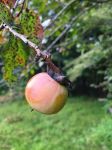
30th: It is fall and that means the wild American persimmons at the Refuge are beginning to ripen and fall. Packed with vitamin C, they are a favorite of the local foxes and coyotes. – VVH
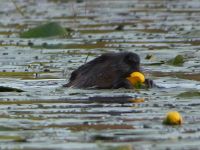
27th: It is Five Dollar Friday, a new and easy way to support Unexpected Wildlife Refuge as we celebrate the close of our 56th year. We have fought to ban trapping state-wide; helped people to live peacefully with beaver families across the state; educated people on how to live humanely with wildlife in general; joined in the effort to protect wildlife from killing contests; provided the opportunity for all indigenous wildlife to live and prosper in our nearly 800 acres of Pine Barrens habitats... and much more.
We need your support! Five minutes and five dollars is all it takes today to help us continue our work. Click the Donate button at the top of our Facebook page to pledge your commitment to helping those who continue to be victims of human prejudice and greed. Please donate and share! – VVH
#fivedollarfridays
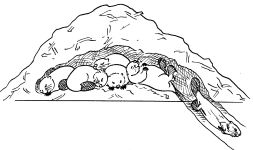
26th: Throwback to this undated sketch by Hope Sawyer Buyukmihci, Refuge co-founder, of a family of beavers nestling into their cozy lodge. Beaver lodges are remarkable achievements of engineering. Outside the main underwater entrance – which keeps the family safe from most predators – is a forest of branches sunk into the mud, a cache of food especially important in the winter months when green food is scarce. In the lodge, there are two distinct areas. The first is used by the beavers to dry off before entering the main area which comprises the living and sleeping quarters.
A beaver lodge is built with a central chimney, a narrow tunnel built up into the roof to allow the exchange of oxygen and carbon dioxide. Beavers are also frequently observed sharing the inside of their lodges with muskrats and otters. The sloping outer sides are used by turtles to bask in sunshine. Herons and kingfishers can often be found resting on top of the lodge. Last summer, we paddled by a lodge where a Canada goose family had chosen to build their nest. Beavers, a keystone species, are vital to all local wildlife.
As winter nears, the beavers at the Refuge will be retreating to a lodge very much like this one, at the far end of the main pond. – VVH
#tbt #ThrowbackThursday #uwrhistory #beavers #wetlandhabitat #keystonespecies
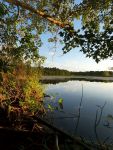
25th: One of my favorite features of the geography at the Refuge is the perspective one can get from the water's edge at the main pond. This is the view from below the modest dam that the local beavers have constructed next to the walkways by the pond. – VVH
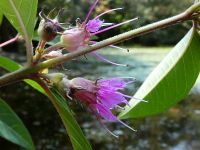
23rd: This colorful photo of swamp loosestrife in Muddy Bog was part of our recent Beaver Tales newsletter. As with the egret photo posted recently, I thought it was worth sharing again in case some of you do not subscribe to our newsletter. Muddy Bog, one of the many vital habitats for the animals and plants who live here, can always be counted on to thrill the visual senses. – VVH
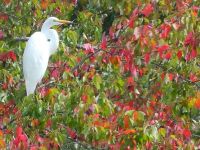
21st: Those of you who get our electronic Beaver Tales newsletter will recognize this photo of a great egret with the background of colorful leaves. It is such a striking demonstration of the beauty to be seen at the Refuge this fall (and always) that I am sharing it here for those who are not yet signed up for our newsletter. If you would like to be on our list, please send me an E-mail message (director@unexpectedwildliferefuge.org). Include your name and state (or country, if not USA). – VVH
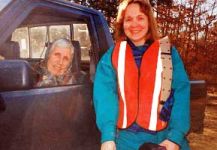
19th: Throwback to this undated photo taken during the Refuge's annual fall deer patrol. Here, Hope Sawyer Buyukmihci, Refuge co-founder, confers with Angi Metler, volunteer. To join us for our annual patrol, please call or E-mail us and we will be happy – and grateful – to add you to the schedule.
E-mail: director@unexpectedwildliferefuge.org
Phone: 856.697.3541
– VVH
#tbt #ThrowbackThursday #UWRHistory
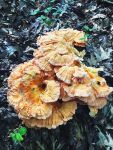
18th: Colloquially known as white-pored chicken of the woods, this mushroom is one of the more vibrant funguses found at the Refuge. I recently spotted this beautiful patch on one of the trails. – VVH
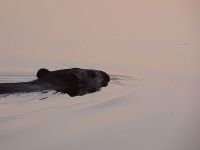
16th: A beaver takes a sunset swim across the main pond one recent evening at the Refuge. – VVH
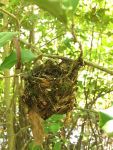
14th: Once the leaves begin to drop from the trees and shrubs in early fall, we start to discover nests dotting the landscape. This beautiful little nest was probably built by vireos. – VVH

12th: Throwback to an early-morning photo of volunteer Mary Ann Gurka during the 2016 deer patrol at the Refuge. It is time again to make a commitment to help us keep the Refuge safe. We need volunteers to help patrol the boundary throughout hunting 'season'. Whether you have volunteered before or would like to join our team, please let us know through director@unexpectedwildliferefuge.org or by telephone (856.697.3541). – VVH
#tbt #ThrowbackThursday #UWRhistory
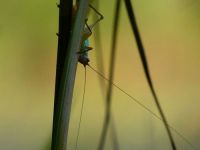
11th: A grasshopper climbs some tall wool grass near the main pond at the Refuge. – VVH
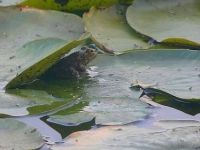
9th: One late evening, I was watching this small green frog on the main pond at the Refuge. As a great blue heron flew overhead, squawking loudly, this little frog hustled himself backwards to be under the protection of a large lily pad where he sat watchful until the sun set. – VVH
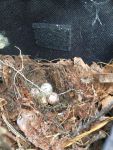
7th: Home is where the eggs are
Wrens sometimes choose unusual (from our perspective) spots in which to build their nests. Recently, I walked outside to get something from an old work apron that had been hanging in an outbuilding by the cabin. I found this wren's nest filled with eggs in a large pocket of the apron. Because of this, I retreated and left the nest alone for several weeks to see whether the nest was active. I never saw any adults, however, so I concluded the nest had been abandoned for whatever reason or that something had prevented the parents continuing with the raising of a family. – VVH
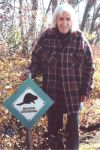
5th: Our Throwback Thursday post is dedicated to our founders, Hope Sawyer Buyukmihci and Cavit Buyukmihci. Here, Hope is shown next to a "Beaver Crossing" sign at the Refuge. While celebrating more than 55 years of preserving vital Pine Barrens habitat and advocating for local wildlife, we pay tribute to those who made this possible.
But, we need your help more than ever to protect these 767 acres that are home to the indigenous wildlife of southern New Jersey. We cannot do it without our supporters. As we end the 3rd quarter for 2017, we have so far received donations that cover only a small fraction of the nominal budget for the year. Please consider a donation, today, using the "Donate" button at the top of our Facebook page or send us a check or use the PayPal or JustGiving buttons on our menu or our Help Us page. We are desperate for your support and every donation helps! – VVH
#tbt #ThrowbackThursday #UWRHistory #NJPinebarrens #conservation #donate
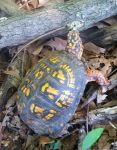
3rd: The eastern box turtle has been under incredible negative pressure due to habitat loss and fragmentation. Listed federally as "vulnerable", box turtles do not reproduce rapidly, adding to their vulnerability. Habitat fragmentation means that these slow-moving turtles often have to cross roads in order to find food, mates or shelter. As a result, they are killed by cars. Farming equipment is another hazard as these turtles plod along from one place to another. This beautiful individual was recently sighted and photographed by Chris Tlapa, Refuge visitor and volunteer. – VVH
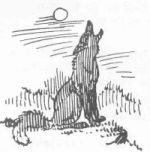
1st: We are concerned to learn of the decision by the city of Saddle River, New Jersey, to authorize the shooting of coyotes when it is perceived that they pose a threat. This edict is not based on any documented or real threats to people, only on supposition. It is well-known that coyotes generally are fearful of people and would not normally pose a threat. The reason that they are showing up in residential areas is largely because people either purposefully feed them or leave food where it is accessible to them. At least five coyotes have already been killed as of writing this (see link below to news article). Killing fails to address the root issues involved. As long as people feed or provide food – even if inadvertently, including allowing cats or small dogs to roam unsupervised outdoors (to coyotes, these individuals are 'food') – or otherwise encourage them, coyotes are likely to enter residential areas. The city should provide for substantial fines or other penalties in these situations. Further, the current policy has no basis in fact and may be acted upon due to ignorance or misinterpretation of normal coyote behavior.
Please join us in politely asking Mayor Albert J. Kurpis to abandon lethal methods of 'resolution' and, instead, work with responsible and knowledgeable wildlife experts to draft a policy on how his constituents can discourage coyotes from coming into the city.
Mayor Albert J. Kurpis
Email: drkurpis@saddleriver.org
Phone: 201.327.2609
News article: http://www.northjersey.com/story/news/bergen/saddle-river/2017/09/29/five-coyotes-killed-saddle-river-officials-say/714617001/ – VVH
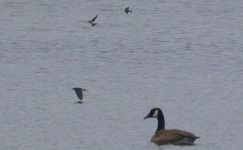
30th: A Canada goose peacefully paddles across the main pond at the Refuge, while tree swallows swiftly skim the water's surface. – VVH
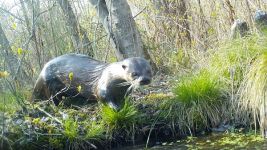
27th: Unexpected Wildlife Refuge has a fantastic opportunity to win $10,000 from eBay for Charity. This money could go a long way in helping us preserve this sanctuary with its vital and varied habitats for the wildlife who call it home, including some who are in danger of extinction due to global habitat loss and fragmentation.
Because the grant is given based on the number of "favorites" an organization receives, every person who adds the Refuge as their favorite charity on their eBay account increases our chance of winning. We only have until the 4th of October, so please participate now and share with everyone you can.
The eBay for Charity Web site is https://charity.ebay.com/charity/Unexpected-Wildlife-Refuge-Inc./112813. You will have to sign in (or create an account) and then click on "Add to My Favorites". – VVH
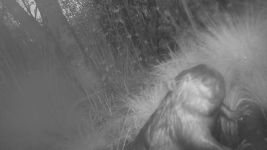
26th: A Refuge trail camera captured this image of a beaver emerging from one of the small pools in a wetland along the trails. – VVH
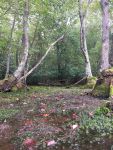
24th: Autumn is here. Our Muddy Bog is already boasting some beautiful fall colors. – VVH
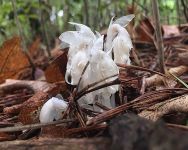
23rd: In a typical year, I find only a few small patches of this beautiful plant. This year, the Refuge has been flush with stunning groups of Indian pipe flower such as this one. – VVH
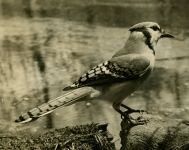
21st: Throwback to 1965, when Al Francesconi, frequent Refuge guest and photographer, captured this image of a blue jay at the Refuge. Even in black and white, the jay's striking wing bars and eye-line are unmistakable. – VVH
#tbt #ThrowbackThursday #UWRHistory #bluejays
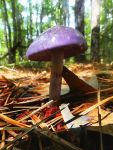
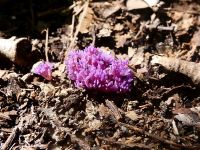
19th: Finding vibrant examples of local funguses is always exciting for me. Here are two of my favorites at the Refuge, the viscid violet cort mushroom and a stunning, tiny violet coral fungus. – VVH
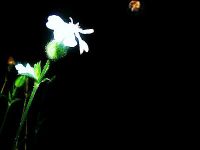
17th: A white campion flower beneath a waxing moon, taken one recent evening at the Refuge. – VVH
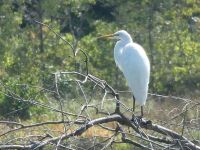
15th: Help Unexpected Wildlife Refuge by donating your vehicle
We are pleased to announce that we have a new way for you to support the Refuge. Your used or unwanted vehicle can provide funds to us through the CARS vehicle donation program. CARS will accept any vehicle, running or non-running, and offer free towing throughout the United States. Once they have processed and sold the vehicle, they will donate a majority of the proceeds directly to the Refuge.
Call toll-free 855-500-RIDE (855.500.7433) or visit the Refuge CARS page to participate. Not only does this provide an easy way to be rid of an unwanted vehicle, you will also be helping wildlife at the same time. – VVH
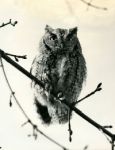
14th: Throwback Thursday this week is dedicated to the haunting sound of the diminutive screech owl, heard one night recently, the first this year. This photo of a different screech owl, maybe a distant relative, was taken 54 years ago by Al Francesconi, frequent Refuge visitor and photographer. – VVH
#tbt #ThrowbackThursday #UWRHistory #owls #screechowls
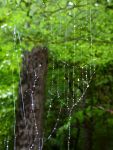
13th: The large web of an orb-weaver spider stretches between the trees across a wide trail at the Refuge. It is shown covered in drops of water from a recent rain. – VVH
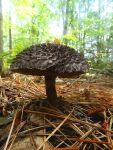
10th: The diversity of the funguses at the Refuge are a real treat for mycologists. I saw this unique and beautiful mushroom known colloquially as "Old Man of the Woods", alongside one of the trails. – VVH
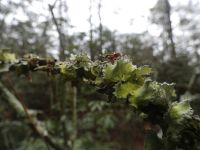
9th: Lichens are complex organisms known to be reliable indicators of air quality, doing poorly when ambient sulfur dioxide concentrations are high. Often overlooked, lichens are a combination of funguses and different types of algae, depending on the species. The lichen uses the algae as a photosynthetic food source and the algae use the fungus as a host. I notice many diverse and beautiful examples of lichen at the Refuge, including this green foliose lichen -- so called because it resembles leaves (foliose comes from the Latin word meaning "full of leaves"). – VVH
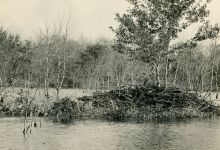
7th: Throwback to 1966, when Refuge co-founder, Hope Sawyer Buyukmihci, took this photo of a food raft built by beavers at the Refuge. An above-water food raft is one method that beavers use to keep food supplies plentiful and close to their lodge. Beavers stay in their warm lodges with their families all winter, so these close-at-hand food stores are vital to their survival. Prior to winter setting in, we will again start seeing the local beavers working diligently to store branches from fast-growing trees for the winter. The 1966 raft was prodigious; I wonder if the beaver architects at the time knew something about that approaching winter that we did not? – VVH
#tbt #ThrowbackThursday #UWRhistory #beavers
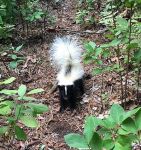
5th: I recently came across this young skunk not too far from the main pond on the trails – he or she seemed surprised to see me. We both spun around and walked in opposite directions, the skunk to avoid this huge 'predator', me to avoid being 'anointed' in essence of skunk. – VVH
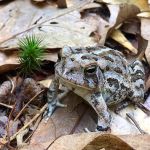
3rd: A Fowler's toad sits next to a seedling near the trailheads at the Refuge. – VVH
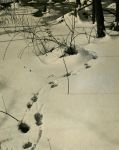
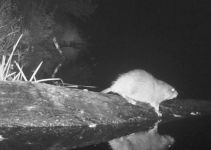
31st: Throwback this week to two photos taken a half a century apart. In 1966, Hope Sawyer Buyukmihci, Refuge co-founder, took the one showing the tracks from a muskrat walking over snow-covered ground. The other image, taken by one of our trail cameras 50 years later, shows a small muskrat taking up a spot on a fallen branch in the main pond. Maybe she is a distant relative of the first individual... – VVH
#tbt #ThrowbackThursday #UWRHistory
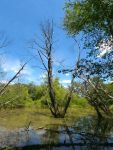
30th: Unexpected Wildlife Refuge comprises many diverse habitats, including some of the most important and rapidly vanishing natural areas in the world – wetlands. Here is a view of one of the swamps, adjacent our boundary trail. Although some may look at this and think it is just 'ugly, muddy water', it is pristine and a vital home to many dozens of animals and plants who would not exist without it. – VVH
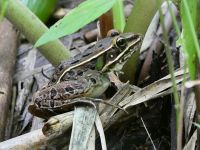
28th: Of the myriad frog voices at the Refuge, the distinctive song of the northern leopard frog is one of my favorites. I hear these frogs often, but see them almost never. It was a pleasant surprise, therefore, when I saw this individual from the corner of my eye while recently walking by the edge of the main pond. He was almost sparkling in the afternoon sun and I was able to get a photograph before he hopped away. – VVH

24th: Throwback to 1967, when Al Francesconi, Refuge guest and photographer, took this captivating photo of a great horned owl at Unexpected. – VVH
#tbt #ThrowbackThursday #UWRHistory #owls
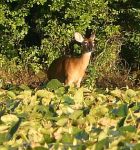
23rd: A white-tailed deer carefully browsing the water lilies at the edge of the main pond near sunset, pauses and looks up over the water. – VVH
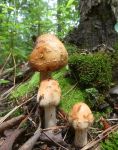
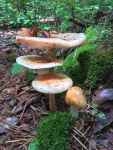
21st: Days and days of recent rains have brought with them an absolutely dizzying variety of mushrooms, many of which appear overnight and can change impressively within hours. Here, a small family of blusher mushrooms (Amanita) demonstrate a striking difference between the 1st and 2nd days I observed them. – VVH
20th: For the beaver enthusiasts in our audience or for those wanting to get a quick education about beavers, you can view a short video by Joe Hanson, PhD (go to https://www.youtube.com/embed/Zm6X77ShHa8 if the link below does not work). This video could even be used to help educate municipalities that are faced with beaver 'problems'. – NCB
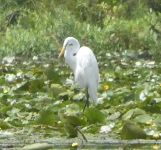
19th: I recently heard one of the local great blue herons carrying on quite a bit. I walked outside to investigate the fuss and discovered that a great egret had come to rest on a small island in the main pond. I had been hoping all spring that the egrets would return this year and it seems that they have. The herons have settled down and have seemingly accepted their new neighbor. – VVH

17th: Throwback to August of 2016. While scrolling through images taken by one of the Refuge trail cameras, I found a series involving raccoon babies. At first, the babies were innocently exploring the camera lens. Then they were mischievously knocking it to the ground, leaving a very humorous series of photos. – VVH
#tbt #ThrowbackThursday #UWRHistory #babyraccoons
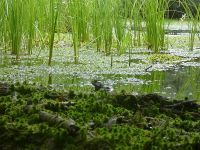
14th: A bullfrog sits in the shallow water at the edge of Muddy Bog, one of the serene, sphagnum-filled wetland areas adjacent Refuge trails. – VVH
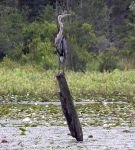
12th: A great blue heron, wet from a recent fishing foray in the main pond, stands watchful on an old tree limb in the water. – VVH
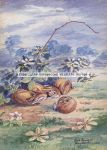
10th: Throwback to 1962, when the Refuge was celebrating its first anniversary and co-founder Hope Sawyer Buyukmihci painted this rabbit family in delicate watercolors. As a reminder, prints of this beautiful painting and others of Hope's, suitable for framing, are available to purchase from our storefront at Zazzle. Every sale helps the Refuge. – VVH
#tbt #ThrowbackThursday #UWRHistory
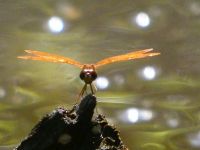
9th: A dragonfly perches in the middle of one of the wetlands near the trails at the Refuge. – VVH
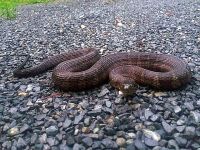
7th: I found this northern water snake in the driveway one evening during a recent rain storm. It is not unusual for these snakes to wander short distances from the safety of their watery homes. – VVH
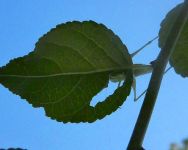
5th: Captured from below, a bright green katydid nibbles on a leaf on a recent sunny afternoon. – VVH
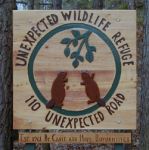
3rd: Throwback to when our now-iconic Refuge sign was brand new. This beautiful wooden sign was made for us by volunteer Jeffrey Lawrenson in 2002. – VVH
#tbt #ThrowbackThursday #UWRHistory
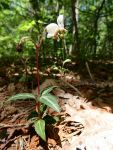
31st: Pipsissewa is a tiny plant that can be seen hugging the ground all over the Refuge if you look carefully. This one was just blooming recently along one of the trails. – VVH
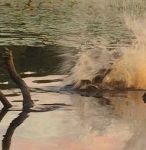
29th: I thought I was unobtrusively photographing the local beaver family in the main pond. Apparently, one of the beavers thought differently and gave a warning slap with her tail before disappearing beneath the surface of the water. I was fortunate to be able to catch the brilliant splash she created. – VVH
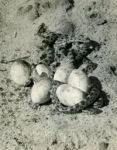
27th: Throwback to 1965, when Al Francesconi, Refuge visitor and photographer, took this beautiful photo of pine snakes just hatching. – VVH
#tbt #ThrowbackThursday #UWRHistory
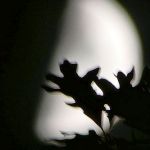
26th: I was recently entranced by the silhouettes of oak leaves cast by the light of a waxing moon. – VVH
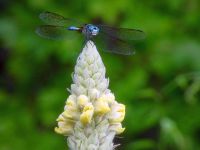
24th: I took this photo recently of a dragonfly flitting off and landing repeatedly on top of this tall mullein plant near the main pond. – VVH
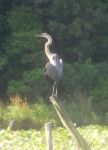
22nd: This great blue heron was sitting on an old tree limb in the middle of the main pond early one morning recently, drying his wings in the warm sun. – VVH
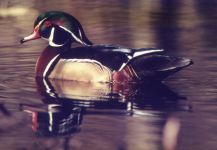
20th: Throwback to 1990, when Ed Abbott, Refuge visitor and photographer, took this photograph of a stunning male wood duck on the water. – VVH
#tbt #ThrowbackThursday #UWRHistory #NJwildlife
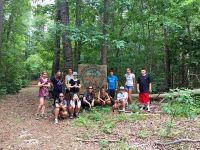
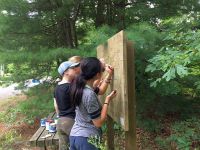
17th: A big thank you to the kids from YMCA Camp Ockanickon, who spent a day volunteering recently. They did a lot of trail work, trimming and clipping brush and repainted our big, wooden trail map board. – VVH
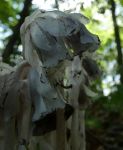
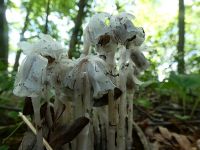
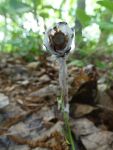
15th: I was thrilled to find this large cluster of Indian pipe, also known as ghost plant or corpse flower, growing near the entrance to the trails at the Refuge. I see this ethereal plant rarely and almost never in a group of this size. Contrary to what its appearance might suggest to some, Indian pipe is a plant and not a fungus. Although it does not photosynthesize like most other plants, it survives and grows by drawing its energy from nearby photosynthesizing trees via local mycorrhizal fungi. The delicate flowers show visible anthers and pollinate like their photosynthetic cousins. – VVH
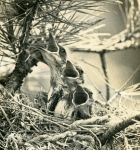
13th: Throwback to 1966, when an unidentified photographer took this great photo of a trio of hungry kingbird babies in the nest. Notice the pieces of small rope used by the parents in making the nest. – VVH
#tbt #ThrowbackThursday #UWRHistory #Kingbirds #birdwatching
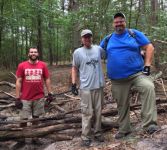

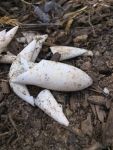
12th: We recently sent out a request to supporters to help the Refuge bolster our trail protections against off-road vehicle use and received a gratifying show of support. Volunteers drove from as far as two hours away on a Saturday to drag fallen trees and brush in an effort to block access to some sensitive areas being damaged by all-terrain vehicles. We worked for hours and built some impressive natural blockades that will still allow pedestrians and other animals to pass through. Pictured, from left, are volunteers Jason Howell of the Pinelands Protection Alliance, Bob Cunningham and Mike Kaliss. The other photos show one of the wetland areas we are protecting and a group of recently hatched turtle eggs right next to the trail -- two of the many reasons we worked so hard to keep this area safe. Thank you to all who showed up to help! – VVH
#PinelandsProtectionAlliance
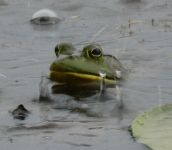
10th: I watched this American bullfrog floating placidly in the main pond, amidst raindrops splashing all around as a recent thunderstorm passed over the Refuge. – VVH
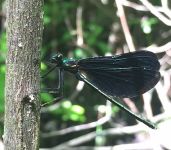
8th: A frequent and shimmering guest to our wetland areas is the ebony jewelwing, a striking little damselfly. – VVH
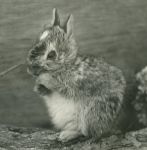
6th: Throwback to 1966, when an unidentified photographer caught this beautiful image of a baby cottontail rabbit at the Refuge. – VVH
#tbt #ThrowbackThursday #UWRHistory #NJPinebarrens #rabbits #NJwildlife
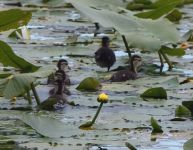
5th: I was fortunate enough to have a squad of wood duck babies swim by as I sat by the main pond one evening. Note the one who decided it was easier to pick her or his way over the lily pads instead of swimming! – VVH
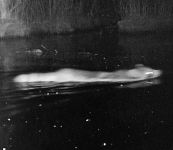
3rd: A raccoon swims by one of the trail cameras set on a wetland area near a Refuge trail. – VVH
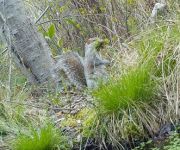
1st: Our trail camera recently photographed this gray squirrel making many trips to the ground to gather soft nesting material such as grasses and leaves. – VVH
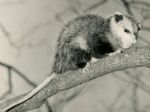
29th: Photographed in 1971 by Refuge co-founder, Cavit Buyukmihci, this young opossum appeared to look askance at the photographer. North America's only marsupial and much-misunderstood, the opossum is one of the best neighbors you can have. Did you know that opossums are fiercely efficient at keeping the tick population low? – VVH
#ThrowbackThursday #tbt #opossums #UWRhistory #marsupials #NJwildlife
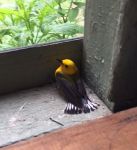
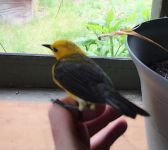
26th: A small prothonotary warbler unexpectedly flew into the cabin's enclosed porch recently and did not seem to know how to get back out. I slowly reached out my hand to him and, to my surprise, he hopped on and stayed on until I walked to the open door. Luckily, I had a camera handy and got these photos before he flew away. – VVH
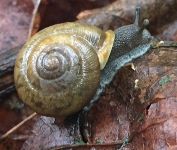
24th: A small, colorful land snail on a dried leaf next to one of the Refuge trails. – VVH
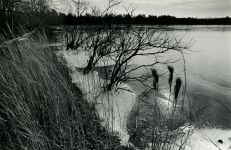
22nd: Throwback to a view from the main pond in 1979, in a photo taken for a feature story about the Refuge in the New Jersey publication, Home News. – VVH
#ThrowbackThursday #tbt #UWRhistory
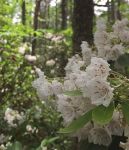
21st: Happy Summer Solstice! A view from one of the Refuge's inner trails which are filled with blossoming mountain laurel. – VVH
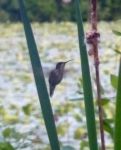
19th: A female ruby-throated hummingbird visited what was left of one of the popular (with nesting birds) gone-to-seed cattails to pull some material for her small nest. – VVH
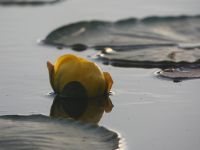
17th: A yellow water lily in the main pond -- a favorite food of the local beavers. – VVH

15th: Refuge co-founder, artist and author, Hope Sawyer Buyukmihci, drew hundreds of black-and-white sketches of wildlife over the years. This one is of a red fox looking up at an owl under a full moon, date unknown. – VVH
#ThrowbackThursday #tbt #UWRHistory #NJwildlife #redfox
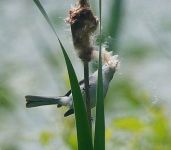
14th: A blue-gray gnatcatcher plucks some warm, soft, nesting material from a cattail near the main pond at the Refuge. – VVH
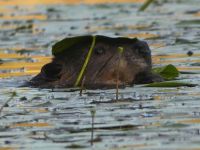
13th: I recently photographed this small beaver "wearing" a lily-pad "hat" while enjoying the aquatic vegetation in the main pond at the Refuge. – VVH
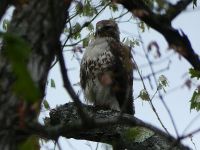
10th: This red-tailed hawk was trying to stay dry under the branches of a large maple tree during one of many rainy days at the Refuge. – VVH
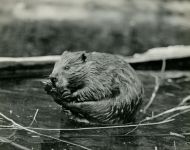
8th: Throwback to a photo taken in 1965 by Refuge co-founder, Hope Sawyer Buyukmihci, of a beaver Hope called Whiskers. There have been beavers living here for many years, possibly pre-dating any human settlement. The Refuge is a great example of how beneficial beavers are to the environment. These industrious and gentle individuals take only what they need while creating rich habitats for a myriad of other species to share. – VVH
#tbt #ThrowbackThursday #UWRhistory #beavers #NJwildlife #NJPinebarrens #beaversarebeneficial #keystonespecies
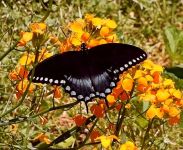
7th: A spicebush swallowtail butterfly near one of the trails at the Refuge. – VVH
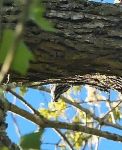
5th: This small black-and-white warbler hung upside-down for a better look at me as I took his photo. – VVH
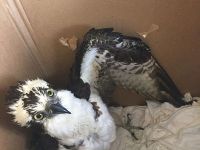
3rd: This young osprey was found in Linwood, New Jersey, dangling from a tall tree with a fish hook through one foot and the attached fishing line wrapped around a tree limb. We helped with the rescue and transportation to Tri-State Bird Rescue & Research in Delaware, a group engaged in the rescue of birds there and in adjacent states. Fishing lures, hooks and lines are a danger – often fatal – to all wildlife. This osprey was lucky to be spotted in time to be rescued. – VVH
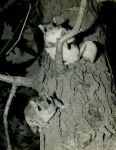
1st: Throwback to 1966 and Al Francesconi, a close friend of the Refuge and patient photographer. Al was known for getting some of the best images of the Refuge wildlife, like these two 'flying' squirrels on a tree trunk. You may remember that last November, we showed you Al's photos of one of the squirrels 'in flight' and landing on a tree. – VVH
#ThrowbackThursday #tbt #UWRHistory #flyingsquirrels #njwildlife #njpinebarrens
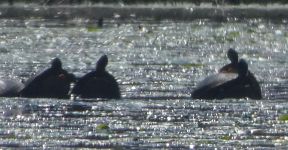
31st: As these red-bellied turtles moved around for a warm basking space on a limb in the middle of the main pond, one small individual decided the best course of action was to climb on the back of a larger one. – VVH

29th: The Baltimore oriole's song has been heard frequently at the Refuge. Here, a male (obvious with his blaze-orange breast), takes a momentary break from singing, high in a tree near the main pond. – VVH
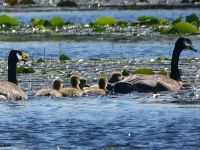
27th: The Canada geese families have generally been elusive, preferring to stay on the far end of the main pond at the Refuge. We were pleasantly surprised to see this group of babies swimming under the protection of their parents recently, close enough for a good photograph. – VVH
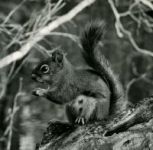
25th: Throwback to 1967, when Refuge co-founder Hope Sawyer Buyukmihci photographed this beautiful red squirrel on a cedar limb at the Refuge. – VVH
#tbt #ThrowbackThursday #UWRhistory #redsquirrels #NJwildlife #NJpinebarrens
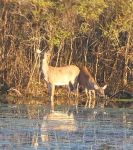
24th: Two white-tailed deer stopped for a late-afternoon drink by the edge of the main pond at the Refuge. – VVH
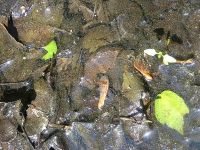
22nd: Do you notice anyone in this photo, hidden among the leaves in the water?
Hint: he or she has keeled scales. – VVH
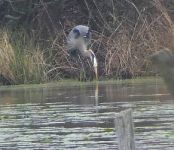
20th: A great blue heron was motionlessly watching the main pond, possibly for fish and small frogs. – VVH
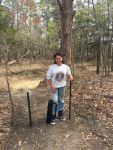
18th: Throwback to April 2016, when Mary Ann Gurka, a frequent Refuge volunteer, was helping us install the first posts to protect the Refuge from illegal and damaging off-road vehicle use on the trails. We now have many effective obstacles in place thanks to help from the Pinelands Protection Alliance and a number of other dedicated volunteers. – VVH
#ThrowbackThursday #tbt #UWRhistory #Pinelands #PineBarrens #NJPineBarrens #PinelandsProtectionAlliance #PPA #NJconservation
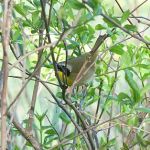
17th: This black-masked warbler, the common yellowthroat, was hiding among the vegetation in some low shrubs near the main pond. – VVH

15th: I have been trying to photograph an otter at the Refuge for more than a year, with no success. Imagine my excitement when I examined the photos recently taken by one of our trail cameras and saw this elusive river otter about to slide into one of the small pools in the wetlands! – VVH
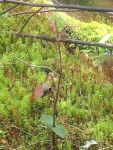
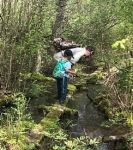
13th: James Pullaro, a recent visitor to the Refuge, shared a photo of a southern twayblade he took along one of the trails at the Refuge. He was pleased by his find and wanted us to be aware that this member of the orchid group is considered rare in New Jersey. At one time, the twayblade was known to grow in only three locations in the state. The other photo is of James showing the orchid to a young guest. Thank you, James, for sharing! – VVH

11th: For our Throwback Thursday post this week, we are sharing an undated sketch by Refuge co-founder, Hope Sawyer Buyukmihci, of a beaver confronted with wire-wrapped trees. Wrapping trees with wire is one of the easy and affordable methods we and other experts recommend to foster a healthy and humane relationship with local beavers when specific trees are to be protected.
#ThrowbackThursday #tbt #UWRHistory #beavers #beaversolutions #beaverbafflers #njwildlife #njpinebarrens – VVH
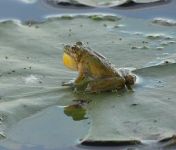
10th: A northern cricket frog sounded his mating call from a lily pad on the main pond at the Refuge. – VVH
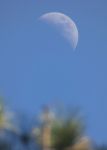
8th: A waxing moon appeared over the pines on one of the trails at the Refuge. – VVH
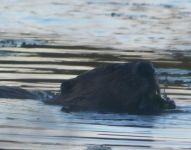
6th: As we watched this beaver at early dusk one evening, we noticed that he or she was deftly grabbing aquatic vegetation to snack on while swimming across the main pond. – VVH
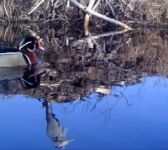
4th: Our Throwback this week is to a photo from 2016 and one of my favorite trail cam images taken at the Refuge. Here, the camera photographed a wood duck swimming past the main beaver lodge and the reflection of a great blue heron perched on top of the lodge. #tbt #ThrowbackThursday #UWRHistory #NJWildlife – VVH
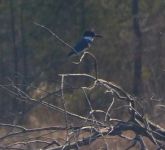
2nd: This belted kingfisher has been regularly spotted flitting back and forth between two favored fishing spots on the main pond at the Refuge. Here, she sits on a dead tree in the middle of the main pond. – VVH
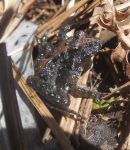
29th: One of the petite (1/2 - 1 inch 'diameter'), but raucous, frogs who make their presence known throughout the wetlands of the Refuge is the Northern cricket frog. The one shown here had stopped midway as he was traversing the walkway from one side of a small pool to the other. The distinctive patterns differ in color between individuals and may include shades of green and brown or russet red. – VVH

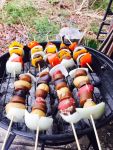

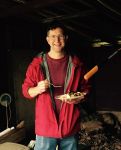
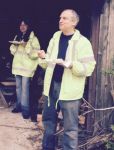
28th: Thank you to all of our volunteers who made our annual Earth Day Cleanup a success! We focused on cleaning up the stretch of Piney Hollow Road where it borders the Refuge and we collected 12 large bags of trash and recyclable materials. Our vegan barbecue this year featured Tofurky Italian sausage with peppers and onions, Tofurky kielbasa with baby potatoes and onions with a Dijon dip and potato and macaroni salads made with Just Mayo, egg-less mayonnaise. One of our volunteers brought a vegan chocolate cake with strawberry icing made with fresh strawberries.
We had a fantastic day, thanks to the great company of our volunteers and their dedication to helping us keep the Refuge clean. – VVH
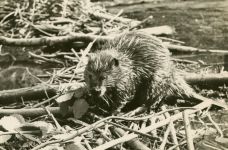
27th: Throwback this week to a young beaver born to a mother called Whiskers in 1965. There have been beavers at the Refuge for as long as we know, creating beautiful habitat for other animals, and taking only what they need from the plentiful trees and water plants to raise their families. #tbt #ThrowbackThursday #UWRHistory #beavers #NJbeavers #NJWildlife – VVH
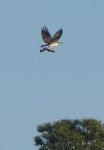
25th: We have been noticing at least two adult ospreys at the Refuge. Almost daily, these birds were seen diving from tall pine trees next to the main pond across from the cabin. The photo shows one who was successful in catching a fish during one of those dives. We, of course, feel sorry for the fish, but we can take comfort in knowing that the animals (and plants) at the Refuge live freely as nature 'intended' and that, unlike us, their dietary choices often of necessity result in one life ending so that another may continue. – VVH
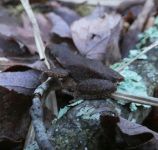
23rd: The Refuge at night has been alive with frog songs. Although sometimes cacophonous to our ears, these voices are critical to the reproductive lives of these amphibians. Amidst the mixture of sounds, we were able to identify carpenter frogs, cricket frogs, green frogs, leopard frogs and, very recently, bullfrogs. One of the first to awaken and sing was this little one with the mighty chirp, the northern spring peeper, who was sitting on a small branch in the Muddy Bog. – VVH
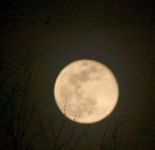
21st: I went out to photograph our first full moon of spring, named "pink moon" after the ground phlox, an early-spring blooming pink flower. As I was taking this photo, a brown bat flew into frame. We have adjusted the color a bit so you can see her or him in the upper left corner of the picture. I could not have timed this photograph better if I tried! – VVH
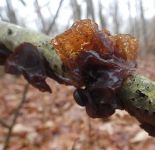
19th: Recent rains brought out this pretty, albeit common, amber, translucent jelly roll fungus. – VVH
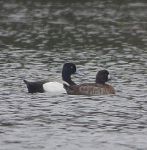
17th: A lesser scaup couple swim together on the main pond at the Refuge. – VVH
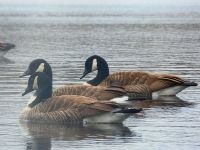
14th: Wildlife biologists who study Canada geese, tell individuals apart by the white feathers partially wrapping the heads. These so-called chin straps are unique in pattern to each bird, as you can see in these three individuals on the main pond. – VVH

13th: Throwback to 1971, the year of Unexpected's tenth anniversary. Al Francesconi, frequent Refuge guest and photographer, took this great photo of a beautiful gray tree frog sitting on a moss-covered log.
#tbt #ThrowbackThursday #UWRHistory #frogs #treefrogs #njwildlife – VVH
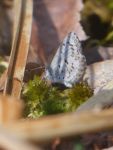
12th: This small spring azure butterfly was taking a drink from the moss in one of the wetlands at the Refuge. – VVH
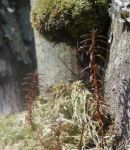
10th: These brown shoots, shaped a bit like rosemary, are white cedar seedlings, beginning to grow in a bed of sphagnum moss in one of the bogs at the Refuge. – VVH
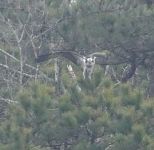
8th: We were happy to see a 'new' visitor to the Refuge. This osprey had been sighted around the main pond for days in a row. Here, he or she has just started to take flight, perhaps to do some fishing. – VVH
7th: Beavers killed and eaten
We were saddened to learn about this event by the Fraternal Order of Eagles, Aerie # 1966. Without in any way meaning to imply that other wildlife are not important or deserving of our compassion, beavers are a keystone species -- they are necessary for a healthy ecosystem. Beavers are smart, industrious and family-oriented and they form close communities wherever they choose to live. The Eagles organization has a history of charitable giving and community involvement. We hope that next year, they extend their compassion to New Jersey's beaver population and not consider them a 'novelty' food item. Please consider a POLITE and CIVIL message to them asking them to take beavers 'off the menu' in the future: https://www.facebook.com/events/1882762331968145/ – VVH
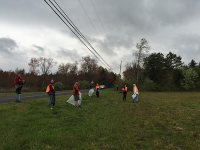
6th: Throwback to last year's Earth Day Cleanup at Unexpected Wildlife Refuge. Volunteers happily braved the cold, rainy day to help us in our annual trash collection along a busy road adjacent the Refuge. Join us this year on Saturday, April 22, at 11 AM. Everything you need to help us gather trash shall be supplied. Volunteers are invited to a vegan barbecue at headquarters after the cleanup. RSVP by email or phone: director@unexpectedwildliferefuge.org or 856.697.3541. We will be posting an event page soon.
#TBT #ThrowbackThursday #UWRHistory #EarthDay #EarthDay2017 – VVH
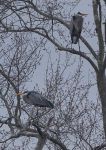
5th: These great blue herons perched in a tree on a windy day, high above the main pond at the Refuge. They had been very social with each other. I watched them fly around the pond, landing and otherwise spending time together. I have a feeling a clutch of heron eggs is not too far off in the future. – VVH
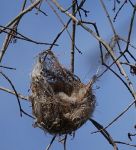
3rd: A Baltimore oriole's intricate, cup-like nest from last year hangs from a branch high in a tree by the cabin at the Refuge. Orioles sometimes recycle nesting materials from a previous year's nest. If the female oriole revisits this one this spring, I may post an update if I can get a good photo. – VVH
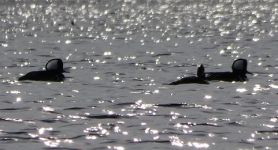
1st: A trio of hooded mergansers near sunset on the main pond. The male mergansers have characteristic hoods with bold white patches, whereas the females have ruddy-red hoods. A second female was trailing behind her companions and is not pictured. – VVH
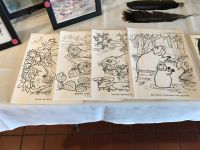
31st: We were pleased to be invited to participate again in the Lines on the Pines (New Jersey), event earlier this month. This event is a showcase for local Pinelands artists, craftspeople, authors and more. We displayed the artwork and books by Refuge co-founder Hope Sawyer Buyukmihci. Part of this year's event theme was involvement for young people. To accommodate this, we brought along some coloring pages for children designed by Hope (shown in photo). We also had feathers we found from wild turkeys, turkey vultures and red-tailed hawks, and part of a tree felled by Refuge beavers.
#PineBarrens #NJPineBarrens #LinesonthePines – VVH
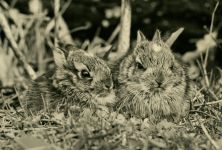
30th: Our "Throwback Thursday" post this week features baby cottontail rabbits in a photo from 1966 -- just a few years after the Refuge was founded. This is a great time to remind everyone that baby rabbits appearing to be 'alone' in your yard are not abandoned. Mother rabbits leave their young for many hours at a time to look for food. They come back only a few times during the day to nurse their young. If you see young rabbits in your yard, do not interfere with them and be sure that no domestic predators (like cats or dogs) can get to them. If in doubt, call a local wildlife rehabber for advice.
#Throwback Thursday # TBT #UWRHistory #Cottontailrabbits #rabbits #NJWildlife – VVH
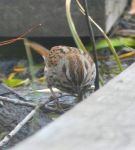
29th: A song sparrow takes a drink from a rivulet of water between the wooden boardwalks by the main pond at the Refuge. – VVH
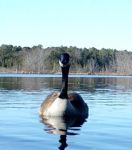
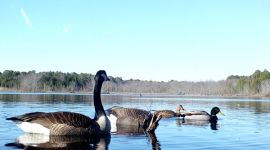
27th: We were fortunate to be the recipient of a Lush Fresh Handmade Cosmetics grant through their Charity Pot program. Lush chooses organizations who are doing conservation and educational work. With this grant, we were able to purchase a few extra trail cameras so we can increase our unobtrusive witnessing of wildlife at the Refuge.
Here are two photos taken recently by one of these cameras placed on the main pond. In the first, a Canada goose seems to be looking directly into the camera. In the second, a Canada goose glances over in the direction of another goose searching for food under water and a mallard duck couple paddling by. – VVH
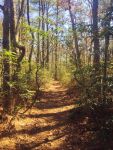
25th: The mountain laurel at the Refuge is creating pretty, verdant corridors on some of the back trails. – VVH
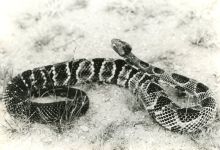
23rd: Though I haven't yet been fortunate enough to see one, this 1984 photo of a timber rattlesnake (also known as a banded rattlesnake), taken by co-founder Hope Sawyer Buyukmihci, shows us that these snakes were at least here at some point in the not too distant past. People mistakenly consider rattlesnakes to be dangerous and have killed them (who is the dangerous one?) to the point of near extinction in some locales. Like all snakes, the reclusive rattlesnake is a critical part of a healthy, vibrant and diverse ecosystem. #tbt #ThrowbackThursday #UWRHistory #NJWildlife #PineBarrens #Rattlesnakes – VVH
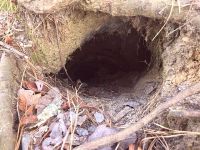
22nd: We marveled at the precision, neatness and natural beauty of the entrance to this red fox den at the Refuge. – VVH
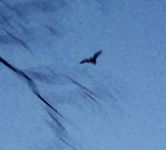
20th: Little brown bats were once a very common sight in early-evening skies. Sadly, the "white-nose syndrome", caused by a fungus accidentally brought here from Eurasia, has killed millions of individuals belonging to various groups of hibernating species of bats, including the little brown bat. Last year at the Refuge, we saw just a couple of little brown bats emerging at dusk to fly over the main pond. Recently, however, we were thrilled when we witnessed almost a dozen taking wing over the water and tree line at sunset. – VVH
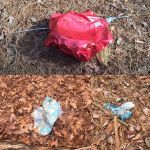
18th: The release of Mylar, latex or any balloons into the environment can be deadly to animals, especially balloons that float in the air and eventually break and drop to the earth's surface, often miles from their origin. I find Mylar balloons and their strings on the ground and in trees and shrubs. Animals can become immobilized or entangled by the non-biodegradable strings and will die of starvation, dehydration or gangrene from strangulation of a limb. Balloons are sometimes ingested by animals, leading to gastrointestinal obstruction and death. Pictured is a small sample of the balloons I have found at the Refuge recently. These balloons should be banned because there is no way to prevent their release into the atmosphere. In the meantime, it is critical that people understand the danger to animals and not allow anyone to use these balloons outdoors regardless of a 'controlled' situation because 'accidents' will happen. Worse, some people purposefully release these balloons as part of an event. If you hear a local organization is planning a balloon release, urge them to consider a more environmentally friendly event. For more information, see https://balloonsblow.org/. – VVH
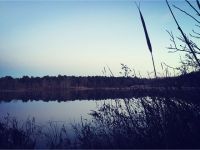
15th: Here is a recent view of the main pond at dusk. Although I was unable to get photos, while I watched, ring-necked ducks, hooded mergansers, mallards, black ducks, three great blue herons and Canada geese made appearances. – VVH
|
13th: I was excited to hear early one morning the call of a red-shouldered hawk who was high in the trees at the Refuge. This species of hawk is uncommon on much of the East Coast. Unfortunately, I was only able to capture her or his voice in this YouTube video. Here is a direct link as well: https://youtu.be/QXOHOlZpbEU. – VVH |
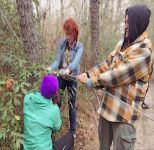
11th: We recently teamed up with Pinelands Protection Alliance (PPA) and the New Jersey Department of Environmental Protection (DEP) Watershed Ambassadors to clean and protect from off-road vehicles a sensitive Pinelands area which is home to some rare and endangered plant and animal species endemic to the New Jersey Pine Barrens. Pictured are two PPA volunteers and Refuge director, Veronica Van Hof (center).
#PinelandsProtectionAlliance #PPA #NJPineBarrens #Endangeredspecies – VVH
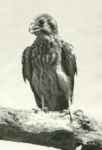
9th: Refuge visitor and photographer, Al Francesconi, captured this image of a beautiful young American kestrel, North America's smallest falcon. The photo was taken in 1966, five years after the Refuge was founded. #tbt #ThrowbackThursday #UWRHistory #NJWildlife #Falcons – VVH
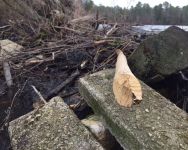
8th: It looks like someone has been trying to 'help' us maintain the boardwalk area by the main pond. You can see the end of a freshly chewed branch that had been inserted into the existing dam. (Yes, the someone was a beaver.) – VVH
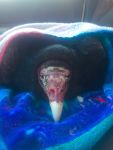
6th: Although we have no facilities for rehabilitating injured animals at the Refuge, we occasionally receive calls about wildlife in distress. I got a call about an injured turkey vulture who had been on the side of a highway for almost three days. She had endured the cold nights and a fierce rain and wind storm, and likely had had no food for two days and nights. She allowed me to approach her, gather her into a towel and transport her to a local rehabber where she will be treated for her injury, exposure and dehydration. I am told her outlook for release back to a free-living state is very good. – VVH
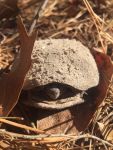
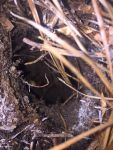
4th: Eastern mud turtles spend the winter hibernating in dens. They dig into the substrate of their pond or in the soil on land, about three feet deep so that they are under the frost line. This one, still covered in sandy soil, had just climbed out of a den and was on her or his way to the pond about 30 feet away. The mud turtle is reputed to be the rarest indigenous turtle in New York state and is listed as endangered in New York and Indiana due to habitat destruction, especially loss and fragmentation of wetlands. – VVH

2nd: Refuge co-founder Hope Sawyer Buyukmihci stands next to a "Beaver Crossing" sign at the Refuge in the fall of 2000. #tbt #ThrowbackThursday #UWRHistory #Beavers #NJWildlife – VVH
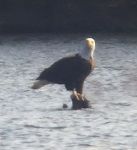
1st: A bald eagle looks up while fishing from an old tree stump in the main pond. – VVH
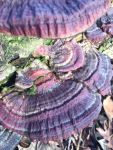
27th: I found this beautiful purple shelf fungus near the swamp on the main trail. Although it could be an old Ganoderma sessile, I think it is probably a turkey tail Trametes versicolor. I have never seen one quite this vibrant. – VVH
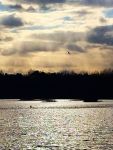
25th: A bald eagle flies against the backdrop of crepuscular rays over the main pond. – VVH
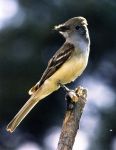
23rd: Refuge visitor and photographer, Ray Davis, caught this beautiful image of a great crested flycatcher on a sunny day at the Refuge in 1989. #tbt #ThrowbackThursday #UWRhistory – VVH
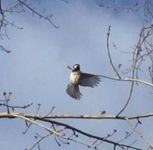
22nd: A small Carolina chickadee comes in for a landing. – VVH
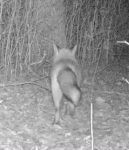
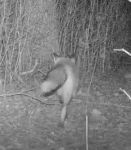
20th: One of the trail cameras caught a video and still photos of this small red fox bounding by one night recently. The shapes of the ears and tail are unmistakable, even in the dark. – VVH
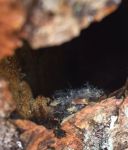
18th: It looks like someone has been using this cozy cavity in an old tree at one of the bogs at the Refuge, as evidenced by this small fluff of down left at the entrance. – VVH
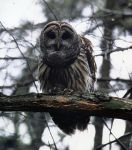
16th: A barred owl perches on a branch in this 1990 photo taken by Refuge visitor Bernie Hehl.
#tbt #ThrowbackThursday #UWRhistory #NJwildlife – VVH
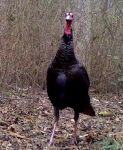
14th: One of our trail cameras photographed this beautiful and alert female turkey trailing behind her companions, early one morning. – VVH
|
12th: Raccoons are not the only ones curious about what we leave behind in these woods. No matter how well we conceal our cameras, some smart and observant residents find and investigate them. Here, a small opossum 'discovers' a trail camera and thoroughly 'checks it out'. If the video does not play for you here, you can access it directly at https://youtu.be/kh6dSFU5kDg. – VVH |
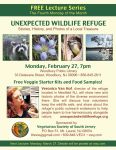
11th: We will be presenting a short history of Unexpected Wildlife Refuge, including the natural history of the land, on February 27 in Woodbury, New Jersey. This program is part of the lecture series presented by the Vegetarian Society of South Jersey. – VVH
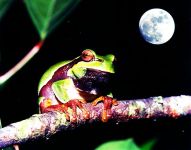
9th: This stunning photo of a rare Pine Barrens tree frog 'under' a full moon was taken by Bob Birdsall at the Refuge in 1989. It was done by using a double exposure. #tbt #ThrowbackThursday #UWRhistory #PineBarrenstreefrog – VVH
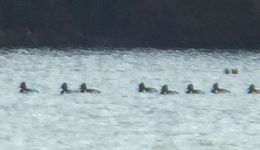
7th: I recently saw and heard a group of small ducks on the main pond and thought they were hooded mergansers from a distance. Although they kept showing up out of range of the camera, I finally managed to get a photo using the cell phone. Despite the relatively poor quality, the photo enabled me to identify these individuals as ring-necked ducks. This is the first time I have seen this species at the Refuge; very exciting! – VVH
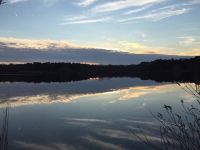
5th: This lovely photo of the main pond was taken by Kendall Berry, who helped the Refuge by patrolling our borders during January. – VVH

2nd: Muskrat tracks in snow. Photo taken in 1966 by Refuge co-founder, Hope Sawyer Buyukmihci. #tbt #ThrowbackThursday #UWRhistory – VVH
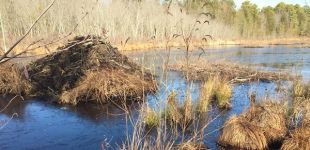
30th: Beavers work tirelessly all fall to save hearty food that will last all through the winter. If you were to go beneath the surface of the water, you would find a store of sticks from fast-growing trees, carefully sunk into the mud near the underwater entrance to their lodge. The beavers also build a 'raft' of food on the surface of the water from which they can sustain themselves all season. This photo shows the lodge and adjacent 'raft'. – VVH
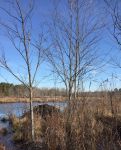
28th: It looks like one of our second-year kits just built himself a new, small lodge right next to his parents' lodge. Good practice for young apprentice beavers! – VVH
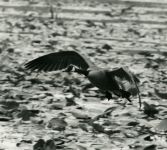
26th: Refuge visitor Richard Rosenberg captured this beautiful image of a Canada goose flying low over the main pond in 1985. #tbt #ThrowbackThursday #UWRhistory – VVH
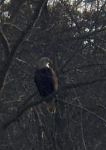
25th: One of the resident adult bald eagles patiently surveys a small opening in the ice on the main pond at the Refuge. – VVH
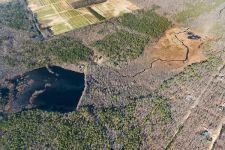
23rd: A supporter of and frequent visitor to the Refuge, Cliff Compton is an aerial photographer. He recently took this beautiful photo of the main pond, headquarters and surrounding habitat as he flew overhead. You may remember that he took a similar photo last year. We are grateful for his contributions to the Refuge archives. – VVH
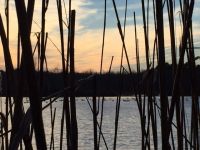
21st: Recently, a flock of Canada geese stopped overnight at the Refuge on their long winter migration. There were so many traveling companions that they stretched from one side of the main pond to the other. It was quite a wonderful sight to behold. – VVH

19th: A young kestrel perches on a bough in this 1966 photo by frequent Refuge guest and photographer, Al Francesconi. #tbt #ThrowbackThursday #UWRHistory #Kestrel – VVH
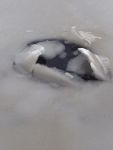
18th: Beavers spend most of the winter in their lodges. They do, however, occasionally leave the comfort of their homes, usually in search of food or materials to maintain their lodge. As a result, they are sometimes faced with an iced over pond surface. This hole was created by a beaver pushing through the ice in the main pond. – VVH
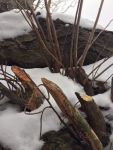
17th: Beavers leave distinctive marks by their incisors in the trees they gnaw or cut down. Here you can see the scalloped pattern in these small trees in the snow. – VVH
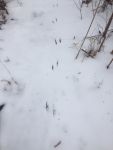
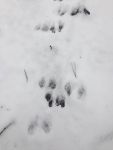
16th: The first snow of the year at the Refuge. Now we can easily see signs of 'traffic', a bird and a rabbit in these photos. – VVH
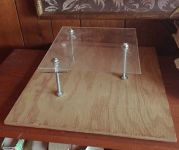
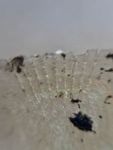
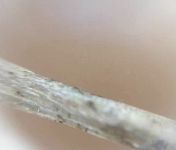
14th: A volunteer came by and helped me build this 'microscope' stand for my cell phone. Shown are photos of small things pulled from an eagle pellet, found on one of the trails: a ctenoid fish scale and a small fish bone. The fish scale has been 'regenerated'; it is not an original scale, rather one that the fish had replaced after an injury. The middle shows the somewhat opaque appearance typical of regrown scales. If this was an original scale, there would be many 'annuli', rings that determine the age of the fish. For instructions on building your own stand, click here. – VVH
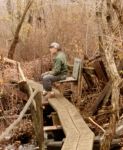
12th: Given that hunting 'season' is still going on, it seems appropriate to show you a picture of Refuge co-founder Cavit Buyukmihci from our archives. In this photo from January 1986, Cavit sits at a strategic site to watch for hunters. Many of you may not know, but Cavit was instrumental in designing and installing all the boardwalks throughout the Refuge, making the task of patrolling more convenient. Of course, the boardwalks also made traversing the many miles of trails more fun during other times of the year. #tbt #ThrowbackThursday #UWRHistory – VVH
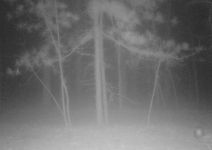
11th: Placing the Refuge trail cameras takes some guesswork and some luck. We do not ever 'bait' our camera stations; rather, we look for signs of animal habitation or activity and hope for the best. This camera was placed at the back of the Refuge, along the long boundary trail. A small animal set off the motion detector and resulted in this beautiful infrared photo of these pine trees. – VVH
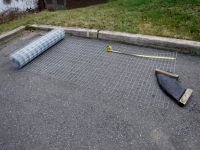
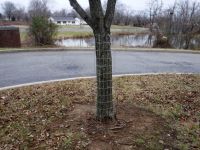
9th: Before the end of 2016, we asked everyone to join us and a local naturalist in an effort to convince the township of Mansfield, New Jersey, to not kill a family of beavers in a local pond. Thankfully, the township agreed and the beavers were allowed to remain at their home in peace. Part of the work ahead is to help the township protect certain trees near the pond. Here are some photos of the wire-wrapping, taken by Chuck Garrett, the naturalist and beaver defender who alerted us to the 'conflict'. As you can see, there are few materials and tools needed and each tree takes just minutes to 'wrap' -- an easy, affordable, effective and HUMANE solution. We recommend, however, that there be at least a six inch space between the wire and the tree so that the beavers cannot gain access to the tree through the mesh openings. To deter easy displacement of these tree 'cages', it may be advisable to pin the bottoms to the ground using something like tent stakes. – VVH
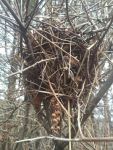
7th: One of the beneficial things (for us) about losing some foliage in the fall and winter is that the bare trees expose some of the bird nests which were so carefully concealed all spring and summer. This, we believe, is the nest of a northern cardinal, built into the fork of a small tree. – VVH

5th: As the days get colder, beavers spend most of their time beneath the ice. They will bolster their lodge for the winter using sticks and mud to keep the interiors cozy. Natural bedding and the warmth of the family keep them from freezing all season. Beavers will stockpile food within the lodge for the winter as well as creating a cache or "raft" of food nearby. The latter are comprised of hearty branches and vegetation that will stay edible over the next few months. This is a photo of such a raft on the main pond, taken by Refuge co-founder Hope Sawyer Buyukmihci in 1966. #tbt #ThrowbackThursday #UWRHistory #Beavers – VVH
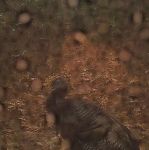
4th: One of the trail cameras captured this rather artistic photo of a female wild turkey during a morning rain. – VVH
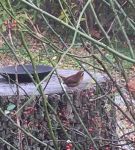
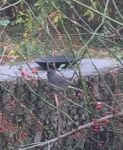
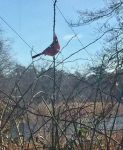
2nd: The wild berries at the Refuge are popular with songbirds. Here, a Carolina wren, a dark-eyed junco and a northern cardinal (who landed above the branches with berries) visited this site at various times during the same day. – VVH
RSS services:
Blogging Fusion Blog Directory
Feed Shark
R-bloggers.com
RSS-Dir.com
RSS Feed Directory - Search and read RSS Feeds without any RSS reader